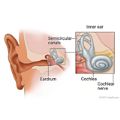Our Health Library information does not replace the advice of a doctor. Please be advised that this information is made available to assist our patients to learn more about their health. Our providers may not see and/or treat all topics found herein.
Topic Contents
Cochlear Implants
Treatment Overview
A cochlear implant is a small electronic device that can help "make" sound if you have a certain type of severe hearing loss in both ears. The implant does the job of the damaged or absent nerve cells that in a normal ear make it possible to hear. Cochlear implants can be programmed according to your specific needs and degree of hearing loss.
Unlike hearing aids, cochlear implants do not make sounds louder but improve how well you hear sound.
A cochlear implant consists of a:
- Microphone worn behind the ear, to pick up sound.
- Speech processor worn on the body. Some types may be worn behind the ear.
- Small device placed under the skin near the ear, with electrodes placed in the cochlea. This is the cochlear implant.
How does it work?
The microphone picks up sound and sends it to the speech processor, which changes the sound to information the cochlear implant can understand. The implant then tells the nerves in the ear to send a message to the brain. The message is understood as sound.
How Well It Works
Cochlear implants have been shown to improve a person's ability to understand speech and speak clearly.
Speech therapy will help you make the most of your cochlear implant. Training in listening, language, and speech-reading skills (paying attention to people's gestures, facial expressions, posture, and tone of voice) may also help you.
Risks
Cochlear implants have a low rate of complications, which may include:
- Risks of surgery, such as infection and general anesthesia, the medicine that puts you to sleep during surgery.
- The implant moving out of its proper location. You may need a second surgery to relocate the implant.
- The implant not working. It may not work because it was made incorrectly or because of an injury to or problem within the ear.
- Twitching of the face (such as a tic) or not being able to move muscles in the face. This is uncommon and rarely permanent.
Bacterial meningitis occurs more often in children with cochlear implants than in children the same age who do not have implants. The Centers for Disease Control and Prevention along with the Food and Drug Administration recommend the following:
- Your child should have all required vaccinations for their age at least 2 weeks before cochlear implant surgery. After surgery, children need to be up to date with all vaccinations.
- Watch for signs of meningitis. These include high fever, headache, stiff neck, feeling sick to the stomach or vomiting, difficulty looking into bright lights, and sleepiness or confusion. A young child or infant might be sleepy, cranky, or eat less. If you see any of these signs, contact your doctor.
- Recognize the signs of an ear infection, including ear pain, fever, and eating less. If you see any of these signs, contact your doctor.
It is possible that a cochlear implant can be affected by a magnetic resonance imaging (MRI) scan. This could cause the implant to stop working. Before you or your child has an MRI, tell your doctor about the cochlear implant.
Credits
Current as of: October 27, 2024
Author: Ignite Healthwise, LLC Staff
Clinical Review Board
All Ignite Healthwise, LLC education is reviewed by a team that includes physicians, nurses, advanced practitioners, registered dieticians, and other healthcare professionals.
Current as of: October 27, 2024
Author: Ignite Healthwise, LLC Staff
Clinical Review Board
All Ignite Healthwise, LLC education is reviewed by a team that includes physicians, nurses, advanced practitioners, registered dieticians, and other healthcare professionals.
This information does not replace the advice of a doctor. Ignite Healthwise, LLC disclaims any warranty or liability for your use of this information. Your use of this information means that you agree to the Terms of Use and Privacy Policy. Learn how we develop our content.
To learn more about Ignite Healthwise, LLC, visit webmdignite.com.
© 2024-2025 Ignite Healthwise, LLC.





